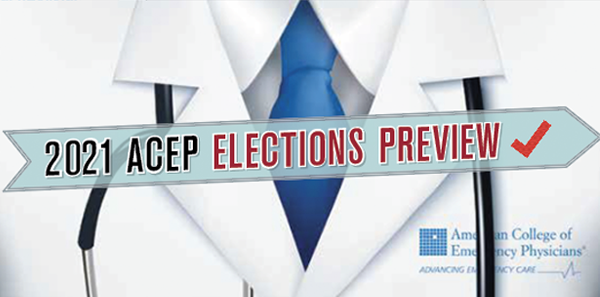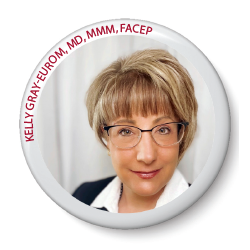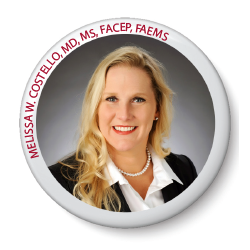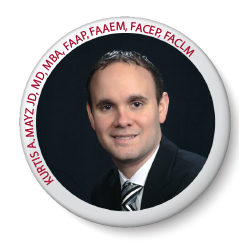
Each year, ACEP’s Council elects new leaders for the College at its meeting. The Council, which represents all 53 chapters, 40 sections of membership, the Association of Academic Chairs of Emergency Medicine, the Council of Emergency Medicine Residency Directors, the Emergency Medicine Residents’ Association, and the Society for Academic Emergency Medicine, will elect the College’s President-Elect, Council Speaker and Vice Speaker, and four members to the ACEP Board of Directors when it meets in October. This month, we’ll meet the Council officer candidates.
Explore This Issue
ACEP Now: Vol 40 – No 08 – August 2021Council Speaker
The following member is a candidate for ACEP Council Speaker.
 Kelly Gray-Eurom, MD, MMM, FACEP
Kelly Gray-Eurom, MD, MMM, FACEP
Current Professional Positions: chief quality officer and assistant dean for quality and safety; associate chair, director of clinical and business operations, and director of PA services department; and professor, department of emergency medicine, at the University of Florida/UF Health Science Center, Jacksonville
Internships and Residency: emergency medicine residency and internship, University of Florida Health Science Center
Medical Degree: MD, University of Vermont College of Medicine (1992)
Response
I am a reserved person, but I am not a quiet person. For the past two years, I have used my voice as the Vice Speaker to advocate for Council and the College at the ACEP Board of Directors meetings. Although I couldn’t raise my hand to be counted when the vote was called, my comments—and more importantly our Council’s comments—were given the opportunity to impact each and every one of those votes.
Council officers are included in every Board meeting and session. The Speaker is part of the Executive Committee of the Board. The Vice Speaker is part of the Finance Committee. We contribute to ACEP strategic planning and high-level deliberations. We are guests of the Board, given the opportunity to actively participate in different facets of the College because we represent the voice and actions of Council. That is a privilege and responsibility I value very much.
The Speaker and Vice Speaker, with the assistance of the Council Steering Committee, work to enhance the impact of their two seats at the Board table through preparation, knowledge, and balance.
Council deliberations help form the framework of College evolution. As a Council officer, I have to be prepared to discuss, advocate, and at times defend Council’s thoughts and actions on resolutions. The Board determines the final action items around each resolution, but they are held accountable to the Council process through the Council Standing Rules (CSR) and the ACEP Bylaws. Knowledge of those documents (and an easily accessed copy of both) help ensure the correct steps are followed during complex decisions. Sometimes the thoughts at the core of those decisions get tricky. The fiduciary responsibility of the ACEP Board is to the College. The fiduciary responsibility of the Council officers is to the members of Council. That difference is subtle but very important because it promotes balance. The difference empowers your Council officers to encourage the balance of Board opinions with thoughts from Council during the Board meetings.
Voting privilege aside, the Board listens to the voices of the Speaker and Vice Speaker because our two voices bring the entirety of Council to the conversation. I hope to promote and increase those conversations over the next two years.
Council Vice Speaker
The following members are candidates for ACEP Council Vice Speaker.
 Melissa W. Costello, MD, MS, FACEP, FAEMS
Melissa W. Costello, MD, MS, FACEP, FAEMS
Current Professional Positions: staff emergency physician, Baldwin Emergency Group, PC, Mobile Infirmary Medical Center, Mobile, Alabama; staff emergency physician, Emergency Room Group, LLC, Singing River Hospital System, Pascagoula, Mississippi; staff emergency physician, Envision Healthcare, Ascension Sacred Heart Hospital, Nine Mile Free Standing ED, Pensacola, Florida; clinical appeals consultant/utilization review, AirMethods Corporation, Denver, Colorado; EMS medical director for Mobile Fire & Rescue and Urban Search and Rescue, Federal Bureau of Investigation Mobile Division SWAT Medical, Baptist LifeFlight/Alabama Lifesaver/AirMethods, and Mobile Police Department and Police Surgeon; medical officer, Trauma Critical Care Team–South, U.S. Department of Health and Human Services
Internships and Residency: emergency medicine residency, Johns Hopkins University School of Medicine, Baltimore
Medical Degree: MD, University of Alabama School of Medicine (2000)
Response
The Council has been well served over many years by its consistency and predictability. Very little has changed in the basic structure and agenda in my 20 years of participation. I have spent my time in the Council either as the lone councillor from a section or as one of two or three councillors from a small state. Over the last few years, there has been robust discussion and task force work regarding the size of the Council as we approach the limits of hotel capacity to accommodate an organization of our size. As we continue to grow, the representation ratios, councillor allocations, and in-person attendance requirements will need to be revisited so that everyone from the largest states to the solo councillor believes they have equal standing in our deliberative process.
Last year, COVID forced us to more fully utilize asynchronous testimony and remote participation in the annual meeting. These are innovations that allowed for more efficient use of the reference committees members’ time, single councillors to contribute to all three reference committees, and a consent agenda from minute one of the “floor” debate. I am convinced these innovations engender greater focus on pivotal issues that benefit from live debate. While there are some kinks to be worked out, I was inspired by the degree of engagement and participation in asynchronous testimony. Although we are returning to the “pre-COVID” way of conducting the Council this year, it is my hope that some hybrid of these new tools will remain in place in order to engage a wider swath of members in the Council process.
 Kurtis A. Mayz, JD, MD, MBA, FAAP, FAAEM, FACEP, FACLM
Kurtis A. Mayz, JD, MD, MBA, FAAP, FAAEM, FACEP, FACLM
Current Professional Positions: traveling emergency medicine physician, United States Acute Care Solutions
Internships and Residency: emergency medicine residency, Stony Brook University Medical Center, Stony Brook, New York
Medical Degree: MD, University of Illinois, Champaign-Urbana (2011)
Response
I want every councillor’s voice heard. One lesson learned from our 2020 meeting was a more longitudinal Council timeline is beneficial to that process. The use of asynchronous testimony was instrumental in the success of the meeting, and we should continue to develop that process further. The development of Council work groups on “hot button” issues could help facilitate the creation of resolutions as well as limiting the sometimes duplicative nature of resolutions. In doing so, we create a more contemplative environment during which ideas can be more thoroughly vetted and refined prior to the Council meeting, with the goal of making the meeting more streamlined and efficient. This process also assists smaller chapters and sections with limited representation in ensuring that their voices can be heard in a way that is sometimes more challenging in the traditional reference committee process.
Council and Council meeting procedure education would help enhance the efficiency of meetings. Approximately one-third of our councillors are new each year. We currently rely on new councillor orientation to introduce the Council and its procedures. As the Council work becomes longer in scope and timeline, it would help to have accessible basic online modules or optional live online opportunities to learn about the Council process and parliamentary procedure. We should also have a resolution development committee that could formally serve to review and provide feedback on resolution ideas and resolutions in development.
At the Council meeting, efficiency is paramount, and we need alternate ways of disseminating information so we are ready to work when the gavel hits. As chair of the Council meeting subcommittee, I advocated limiting the number of in-person speeches in favor of increasing the use of on-demand formats. While I believe that it is important for the candidates and ACEP leadership to have live interaction with the Council, I also believe that we can be more selective in our other presentations. Although it may seem counter-intuitive, by limiting some presentations to prerecorded online formats, I’m convinced we can get more voices and messages heard. Some issues are urgent and need live debate. Others may not be.
Finally, it is important that we continue to leverage technology to ensure a smooth meeting process. We need to ensure that the meeting space is equipped with adequate wi-fi capability that can support our growing numbers. We need to ensure that the technology that we use for amendment submission and the voting process is user friendly and free of error. Our collective portfolio of online and technological services needs to ensure that we can effectively keep councillors up to date and actively engaged in the process before, during, and after the meeting. Once again, the key is that every voice is heard.





No Responses to “2021 ACEP Elections Preview: Meet the Council Officer Candidates”